#hungarian soviet republic
Text
The Counter-revolutionaries are running and propagandizing against us everywhere, beat them! Beat them to death where you find them! If the counter-revolution succeeds even for an hour, they won't spare a single proletarian. Before they can drown our revolution in blood, you must drown them in their own blood!
— Tibor Szamuely (People's Commissar), Vörös Újság (RED NEWS), 11 February 1919.

Tibor Szamuely, directly to Lenin's left, meeting with Vladimir Lenin in Moscow before being sent to Germany to participate in the Spartacist uprising and later the Hungarian Revolution of 1919 becoming the leader of the Lenin Boys, a paramilitary group that served as the armed wing of the Party of Communists in Hungary during their short lived rule as the Hungarian Soviet Republic.
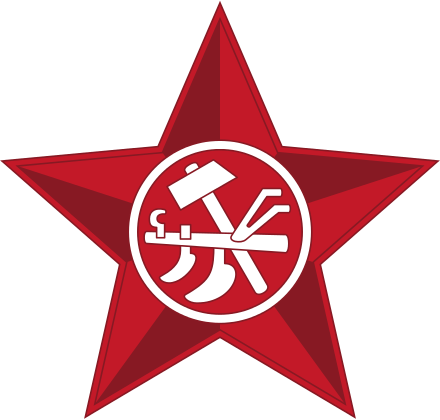
The emblem of the Party of Communists in Hungary
#quotes#Hungary#Hungarian Soviet Republic#armed struggle#counter-revolution#Lenin#Lenin boys#Tibor Szamuely
23 notes
·
View notes
Text
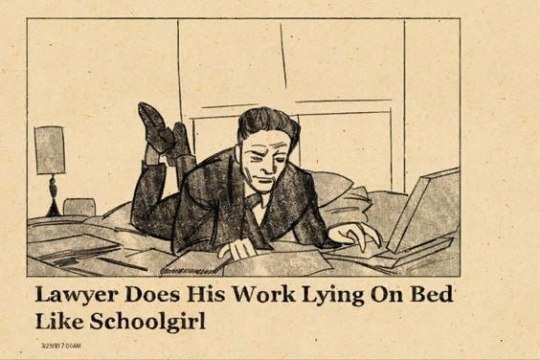
Béla Kun circa 1903
2 notes
·
View notes
Text
Watch "History of the Hungarian People's Republic PLAYLIST" on YouTube
Fantastic work by our comrade The Finnish Bolshevik. It is a series on the History of Socialist Hungary.
If you'd prefer reading the series, you can find it here:
Western Historians would have you believe an "Imperialist" Soviet Russia just went around at the end of WWII invading Eastern and Central Europe and setting up Soviet "authoritarian dictatorships" under Russian control.
Nothing could be further from the truth.
I will try to put together each part into seperate posts throughout the day or over the next few days, but I can't be sure I'll find the time to do that with all 10 or 11 parts.
Each part is not that long, roughly 30-40 minutes, and makes for easy viewing in chunks.
In the videos, The Finnish Bolshevik deep dives into the history of the Hungarian State, how Western Imperialist Powers installed a Fascist Dictatorship, the impact of World Wars 1 and 2 and their aftermath, Hungary's Socialist Revolution, and Hungary's transformation into a Socialist State becoming a satellite of the Soviet Union and much more.
#socialist hungary#hungarian peoples republic#soviet history#socialist history#history#socialism#communism#marxism leninism#socialist politics#socialist#communist#marxism#marxist leninist#progressive politics#politics#socialist worker#socialist news#ussr#ussr history#soviet union#marxist history#dialectical materialism#historical materialism#history of the ussr#hungarian history#hungary#communist history#working class history#working class politics#socialist revolution
7 notes
·
View notes
Text
I’ve got a midterm tomorrow morning, after which i have to write an article review (on an article i haven’t chosen yet), a paper on medieval ghost stories (which i haven’t read yet), and a research proposal (on a topic I haven’t chosen yet), all of which are due in the next two weeks.

16 notes
·
View notes
Photo
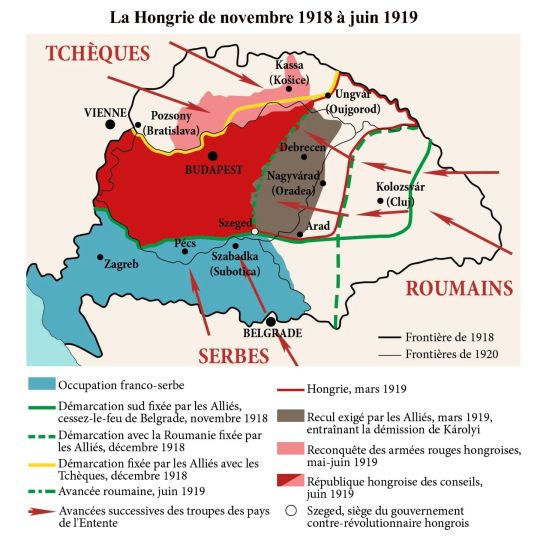
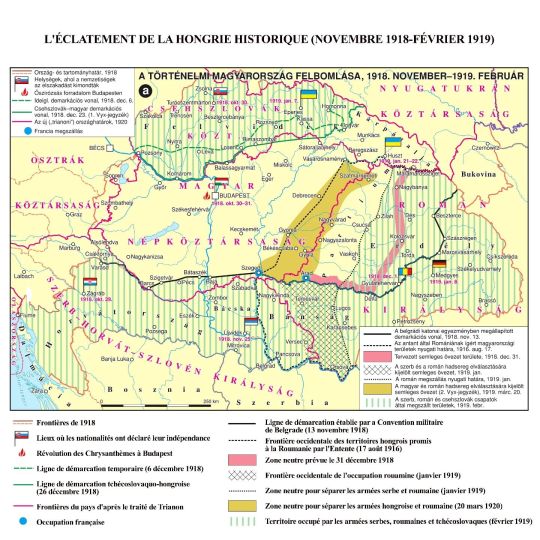
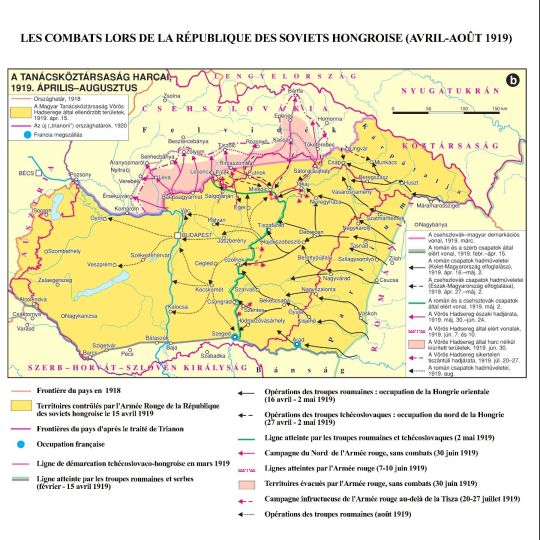
Hungary in 1918-1919
Nicolas de Lamberterie, 2020
"Történelmi atlasz - Középiskolásoknak", József Kaposi, 2016
by cartesdhistoire
Defeats on the front, rising prices, and the agitation of foreign peoples created a troubled situation in Hungary, and in January 1918, a general strike paralyzed activity in Budapest. At the instigation of certain former Hungarian prisoners freed from Russia by the Treaty of Brest-Litovsk and converted to Bolshevism, mutinies took place, and a new general strike of a political nature extended to the entire country on June 20.
On the night of October 29 to 30, Count Mihály Károlyi became the head of government of a de facto independent Hungary: it was the Aster Revolution which established the Hungarian Democratic Republic (November 16).
The head of the inter-allied military mission, the Frenchman Fernand Vix, demanded a retreat of the Hungarian armies by 100 km, an ultimatum which led to the fall of Károlyi and the formation of a government in the hands of the journalist Béla Kun, who had returned from Russia where he had been a companion of Lenin: the Hungarian Soviet Republic was proclaimed on March 21. To face the armed offensives of its neighbors, the government formed a People's Army which, after some successes against the Czechs, was defeated by the Romanians who advanced on Budapest. Béla Kun left the capital on August 1, two days before the arrival of Romanian and Serbian troops supported by French forces (missions led by Berthelot and Franchet d'Espèrey, respectively).
The Bolsheviks' rise to power was poorly received in the provinces and among the Allies. In the southeast of the country occupied by French troops, a national government was formed in June in Szeged whose army was entrusted to Admiral Horthy who, at the time of Béla Kun's fall, already controlled the entire South and West of the country. After negotiating the departure of the Romanians with the Entente, Horthy entered Budapest at the head of his army on November 16. The assembly elected him regent of Hungary on March 1, 1920.
50 notes
·
View notes
Text

Posters of the Hungarian Soviet Republic, Budapest, 1919, From the Budapest Municipal Photography Company archive.
30 notes
·
View notes
Photo

Happy birthday, Josip Broz Tito! (May 7, 1892)
Leader of Yugoslavia from 1944 to his death in 1980, Josip Broz Tito was born to a multi-ethnic family in what is now Croatia and was then part of the Austro-Hungarian Empire, and identified himself as a Croat. He began reading socialist literature in his teenage years and became active in the labor movement. During World War I he was drafted into the Austro-Hungarian military and was captured by Russian forces. Tito escaped his POW camp and partook in the Bolshevik Revolution before returning to Yugoslavia in 1920 and joining the Communist Party there. He engaged in revolutionary activity in the interwar years and faced prison on multiple occasions. He came to lead the Party in 1939, as World War II was beginning, and led the Yugoslav Partisans in resistance to the Axis occupation. Working alongside the Soviet Red Army, the Partisans liberated Belgrade by 1944, and Tito became the leader of the new socialist Yugoslav government. Tito became known as an independent-minded socialist leader who soon moved his country away from the Soviet bloc in favor of a non-aligned foreign policy. Tito articulated his own contributions to Marxist theory, which have collectively became known as Titoism. The major elements of Titoism include non-alignment in foreign affairs, a plurinational Yugoslav identity, and workers’ self-management in a socialist framework. Subsequent Yugoslav leaders failed to govern as effectively as Tito, and the Socialist Federal Republic of Yugoslavia ultimately dissolved in 1992.
172 notes
·
View notes
Text
The Hungarian soviet republic was horrendously mismanaged but it did give us one of the hardest quotes and names for a paramilitary ever
Tibor Szamuely wrote in the pages of the Vörös Újság (Red News): "Everywhere counter-revolutionaries run about and swagger; beat them down! Beat their heads where you find them! If counter-revolutionaries were to gain the upper hand for even a single hour, there will be no mercy on any proletarian. Before they stifle the revolution, suffocate them in their own blood!" With their support, József Cserny organized a group of some 200 individuals known as "Lenin Boys" (Lenin-fiúk), whose intention was to uncover "counter-revolutionary" activities in the Hungarian countryside. Similar groups operated within Budapest.
36 notes
·
View notes
Photo

DISSENT MAGAZINE
At critical times, foreign wars have tested the moral convictions of American leftists and affected the fate of their movement for years to come. The Socialist Party’s opposition to entering the First World War provoked furious state repression but later gained a measure of redemption when Americans learned that U.S. troops had not made the world safe for democracy after all. Leftists proved prescient again in the late 1930s when they rallied to defend the Spanish Republic against a right-wing military and its fascist allies, Italy and Germany. The republic’s defeat emboldened Adolf Hitler to launch what quickly became the Second World War. When, twenty years later, American Communists backed the Soviet Union’s crushing of the Hungarian Revolution of 1956, they shoved their party firmly and irrevocably to the margins of political life, which opened up space for the emergence of a New Left that rejected imperial aggressors of all ideological persuasions.
The war in Ukraine has a good chance of turning into another such decisive event. Who to blame for the bloodshed in that country should be obvious: a massive nation led by an authoritarian ruler with one of the world’s largest militaries at his disposal is seeking to conquer and subjugate a smaller and weaker neighbor. In pursuit of that vicious purpose, Vladimir Putin’s soldiers have committed countless rapes and acts of torture. His air force is systematically trying to destroy Ukraine’s infrastructure and economy, hoping to undermine its citizens’ will to resist. Yet Ukrainians, with the aid of arms from the United States and other NATO countries, have so far managed to fight this superior force to a stalemate.
A sizeable number of American leftists have embraced an alternate reality. For them, the culprit is NATO’s post–Cold War expansion, fueled by the drive of the U.S. state and capital to bend the world to their desires. The popular author and journalist Chris Hedges cracks that the war in Ukraine “doesn’t make any geopolitical sense, but it’s good for business.” The Green Party condemns the “perpetual war mentality” of the “US foreign policy establishment” and concludes, “There are no good guys in this crisis.”
These critics ignore or dismiss the fact that every nation that joined NATO did so willingly, knowing that Russia was capable of launching the kind of attack now underway in Ukraine. In the aftermath of the Soviet Union’s demise, the expansion of NATO may well have been too hasty. But not one of its newer members has done anything to threaten Putin’s regime. And every country that joined the alliance enjoys a democratically elected government. They contrast sharply with the handful of nations, besides Putin’s, that voted against a UN resolution last month demanding the Russians withdraw from Ukraine: Belarus, North Korea, Syria, Nicaragua, Eritrea, and Mali. All but the last are one-party dictatorships, and Mali relies on Russian mercenaries to battle Islamist rebels.
It seems not to bother these leftists that they are making common cause with some of the most atrocious and prominent stalwarts of the Trumpian right. Tucker Carlson routinely bashes the U.S. commitment to Ukraine with lines like “Has Putin ever called me a racist?” while Marjorie Taylor Greene recently declared, “I’m completely against the war in Ukraine. . . . You know who’s driving it? It’s America. America needs to stop pushing the war in Ukraine.”
On February 19, some members of the alliance of right and left staged a demonstration at the Lincoln Memorial in Washington to vent its “Rage Against the War Machine.” Speakers included Ron Paul and Tulsi Gabbard as well as Jill Stein, the Green Party’s 2016 nominee for president, and Medea Benjamin, the founder of Code Pink. Carlson promoted the event on the highest rated “news” show in the history of cable TV. At the Memorial, several protesters flew Russian flags.
To paraphrase August Bebel’s famous line about anti-Semitism, the hostility of those leftists who oppose helping Ukraine is an anti-imperialism of fools—although, unlike past Jew haters, they are fools with good intentions. Wars are always horrible events, no matter who starts them or why. And we on the left should do whatever we can to stop them from starting and end them when they do.
But neither the United States nor its allies forced Putin to invade. In speech after speech, he has made clear his mourning for the loss of the Soviet empire and his firm belief that Ukraine should be part of a revived one, this time sanctified by an Orthodox cross instead of the hammer-and-sickle. As the historian (and my cousin) David A. Bell wrote recently, the United States is not “the only international actor that really matters in the current crisis.” It may have the mightiest war machine, but Biden is not shipping arms to Ukraine in an attempt to subjugate Russia to his will. We should, Bell writes, “judge every international situation on its own terms, considering the actions of all parties, and not just the most powerful one. . . . the horrors Putin has already inflicted on Ukraine, and his long-term goals, are strong reasons . . . for continuing current U.S. policy, despite the attendant costs and risks.”
(Continue Reading)
#politics#the left#dissent magazine#foreign policy#war#progressive#progressive movement#Russia#ukraine#NATO#imperialism
51 notes
·
View notes
Note
3 & 9 for books 📕👀
3. What were your top five books of the year?
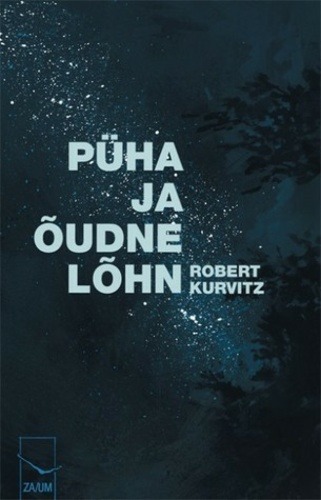
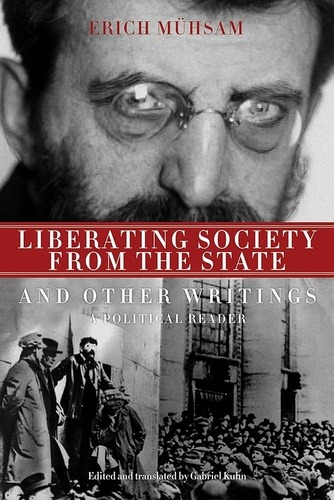
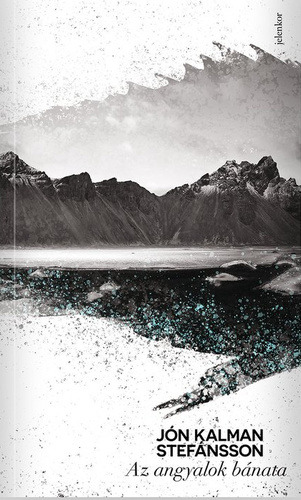
Sacred and terrible air by Robert Kurvitz (Group Ibex translation)
The Disco Elysium novel! I read it like 3 times. I'd recommend it to people who already know about de's lore
Erich Mühsam: Liberating Society from the State and Other Writings - translated and edited by Gabriel Kuhn
A surprisingly very enjoyable read! Excerpts from Erich Mühsam's diaries and political writings. He was a German anarchist who wrote about women's and gay rights, "free love", communism and anarchy, among other things. He tried to work with various leftist organizations, played a key role in the Bavarian Soviet Republic. He was murdered in a concentration camp by the nazis. The book also writes about his relationships with his family, lovers and friends.
The Sorrow of Angels by Jón Kalman Stafánsson
This is the second novel of a trilogy, it takes place in Icelandic fishing villages, nothing big happens, but the novel spends a lot of time introducing all kinds of interesting characters and the relationships between them to the reader, which I'm a fan of. It's also very poetic and a little bit philosophical, it's almost corny but it never crosses that line. The plot of the first book begins with a fisherman and his friend who dies because of a poem, the second book is about the main character finding a new home in another village. I haven't finished this one cause the whole trilogy is like 2800 pages long.
Jan Otčenášek: Občan Brych (Citizen Brych)
A Czech novel I picked up almost randomly from a free library we have here. Similarly to the Icelandic one, the main focus is on the personalities, thoughts and feelings of the characters. The story begins in the occupied Czechoslovakia, and other scenes take place around February 1948.
(I haven't finished this one yet either)
Romano R��cz Sándor: Cigány sor (Gipsy row)
It's an autobiographical novel of a Hungarian Romani writer, with the goal of explaining the Romani point of view and customs to non-romani readers. It was a pretty short but very enjoyable and informative read.
9.Did you get into any new genres?
I tried reading some fantasy but as usually I couldn't really get into it. I read a few chapters of two Discworld books, and they are really good but, idk, it seems like I'm not in the mood these days for fantasy.
But I've read a lot more (auto)biographical books than I usually do!
7 notes
·
View notes
Text
Savage Béla Kun to y'all 💅🏻
2 notes
·
View notes
Text
Twenty-five years ago, as a State Department speechwriter, I worked with Secretary of State Madeleine Albright to secure ratification by the U.S. Senate of NATO’s first enlargement since the 1950s. Like all of us who advised Albright, I felt passionately that bringing Central Europe’s new democracies into NATO was morally right and in America’s interest. But we also believed it was vital to set the highest possible bar for aspiring members. The United States insisted on admitting only Poland, Hungary, and the Czech Republic to NATO during that round—rejecting calls by some European allies to add more countries.
“NATO is a military alliance, not a social club,” Albright told the Senate Foreign Relations Committee. New members had to be ready to contribute to its military missions and committed to its democratic values. They could not bring unresolved internal or border conflicts into NATO—the whole point of the process was to induce them to solve these problems before joining. Back in 1998, for example, we had to be confident that Hungary wouldn’t make territorial claims on neighboring countries with Hungarian minorities.
NATO kept its door open to more members after that first expansion. We expected the biggest test would be bringing in the Baltic States—Estonia, Latvia, and Lithuania—because that would mean bringing states that had once been Soviet republics into the alliance. That Rubicon was crossed in 2004, without any serious harm to NATO-Russia relations. But I didn’t think Ukraine would ever join them. When NATO declared in 2008 that Ukraine “will become” a member, without offering a pathway for membership, I worried it was making a promise that might prove impossible to keep, even if Ukraine fixed its then-profound problems with corruption and democratic governance.
Russia’s full-scale invasion, and Ukraine’s heroic defense of NATO’s founding values, has changed all that.
At the coming NATO summit this July, NATO should offer Ukraine a Membership Action Plan—the first formal step toward membership. It should make clear that Ukraine’s ultimate accession depends solely on actions within its control, not on what Russia does or on the ultimate resolution of the war.
One reason to be serious about Ukrainian membership is that experience has validated the original argument for bringing new members into NATO. In 1997, Albright predicted NATO enlargement would “expand the area of Europe where wars do not happen,” and that turned out to be true. Since then, Russia has only attacked countries not yet protected by the alliance—Ukraine, Georgia, and Moldova.
Experience has also disproved the belief that nations could gain security from Russia by foregoing their aspirations for NATO membership in deference to its concerns. It’s often forgotten that Ukraine adopted a law prohibiting joining military alliances in 2010. Russia invaded anyway in 2014, stealing Ukrainian territory and giving Ukraine’s neighbors reason to fear that their borders were no longer secure, either.
So the old reasons for Ukrainian NATO membership have become stronger; the old fears of provoking Russia have become moot. But there is also a new argument for Ukrainian membership, one that stems naturally from a question that every American and European government is now asking: How do we define Ukrainian victory and Russian defeat?
If the current war were solely about sovereignty—about upholding the principle that borders can’t be erased by tanks—then there could be only one good answer to that question. Ukraine would have to regain all of its territory. And that should remain our common goal.
But Russian President Vladimir Putin’s goal in Ukraine is clearly not just to grab land; nor is land the only thing Ukrainians are defending. U.S. President Joe Biden has said that Ukraine’s “brave resistance is part of a larger fight for democratic principles,” and if that is true—if this war is partly about preserving Ukraine’s freedom to build a democratic society and to align itself with countries that share its values—then Ukraine joining NATO as a strong, pluralistic democracy would also count as victory. It would arguably be as huge a blow to Putin as Ukraine regaining Crimea. It might thus relieve the political pressure Ukraine’s leaders feel to complete that military task more quickly than realities on the ground might allow, and focus them, constructively, on the work required to integrate seamlessly with the Western alliance.
The alternative some have proposed—offering Ukraine security “guarantees” that fall short of NATO membership, as the United States does for Israel, might help until full membership is achieved. But they are no substitute. The United States and Israel don’t have a mutual defense treaty because Israel doesn’t want one—in part because it fears a formal alliance would limit its freedom of action. Ukraine, in contrast, has been asking to assume the responsibilities of joining our alliance. It is a European country suffering exactly the kind of attack NATO was created to prevent, and it’s proving that it is ready and willing to interpose itself between the attacking nation and NATO’s other members—to defend their freedom as well as its own. How can NATO say no to such a country’s aspirations for membership without signaling hesitation to actually guarantee its security, and without validating Putin’s claim that Ukraine is part of a special Russian sphere of influence? There really is only one security guarantee that is taken seriously in Europe, and that is NATO.
That still leaves the question we posed 25 years ago: Can we bring into NATO a country with an unresolved conflict, without obligating the U.S. military to join that conflict? That is a serious and legitimate concern, especially since it is in the nature of an active conflict to expand unpredictably. But the answer cannot be to wait to admit Ukraine until the current war definitively ends. That would give Russia an incentive to never end the war—the very opposite of what NATO’s original enlargement conditions were designed to achieve.
Article 5 of the NATO treaty says that if a member is attacked, each ally must take “such action as it deems necessary, including the use of armed force, to restore and maintain” security. That is a serious legal obligation, even if it does not require going to war in response to every small provocation. But we would still get to define its contours in advance of Ukrainian accession.
If, for example, Russian troops were to still occupy some Ukrainian soil when Ukraine is ready for membership, allies could reach an understanding that Article 5 would not oblige them to take direct part in Ukraine’s operations to regain those remaining territories, but that they would take all feasible measures to stop a further Russian invasion. This would guarantee the security of that large part of Ukraine that its troops have protected and liberated, without committing American Marines to storm Crimea.
For those worried that Ukraine might take dangerous escalatory actions, NATO membership also would provide some insurance. Article 4 of the NATO treaty would require Ukraine and its new allies to “consult together whenever, in the opinion of any of them, the territorial integrity, political independence, or security of any of the Parties is threatened.” Ukraine would have more security; it would also be more embedded in NATO’s military and political institutions, with less freedom to act independently. It would be far better to bring Ukraine into such a structure than to let it remain an extremely well-armed free agent.
Of course, there is still fighting to be done before Ukraine can fully join the alliance. All of NATO’s members will have to be convinced. And Ukraine will have to ensure it is politically and militarily ready. But that is all the more reason to start the formal process now. A democratic Ukraine joining the West is a big part of how this war ends. And Ukrainians should know what they must do to make it happen.
19 notes
·
View notes
Text

Children of Hungary. Sopron and Partium
The Sopron Frontier (Julia)
Having risen up against the Soviets and their cronies with the help of the Austro-Swiss Union, Sopron was effectively the sole-surviving part of western Hungary that still remained intact. Before long, however, it became (and remains to this day) a sanctuary for refugees fleeing what was described as “an endless orgy of destruction,” as well as a stronghold against the chaos beyond what was already being called the Frontier. Despite the difficulties, the region survived long enough to not only become an Austrian protectorate in 1987 but eventually be formally recognized by the Alpine Confederation in 2009.
Today the survivor-nation remains a young but determined bastion of order and civilization. Due to its history and culture, the region is also known for a peculiar union of Austro-Hungarian influences that is in a way an enduring legacy of the old Habsburg Empire. Although not internationally recognized as a successor state to Hungary it has claims through the Alpines, especially Austria, over Western Hungary (despite a lack of resources due to the Sicily incident) and remains a valued member of the Confederation.
The Republic of Partium (Janos)
Amidst the chaos and violence, Debrecen managed to survive, thanks in part to a military group fighting off the warlords until its future was secured by the arrival of the Transylvanians, themselves having survived the destruction of Romania. With the aid of their larger neighbors, the inhabitants once more felt safe enough to not only begin rebuilding their shattered corner of the country but also bring the surrounding region under control. Eventually, the city state became stable enough to proclaim itself the Republic of Partium in 2000.
Under the protection and guidance of Transylvania, Partium today is as stalwart and resilient as it had been in its founding all those years ago. Due to the influence of its more powerful neighbor, the survivor-nation has developed a culture that could be described as part-militant and part-Romanian. Though those same ties, it is also recognized internationally as an official successor to Hungary and with aid has laid claim to all of eastern half of the former country, although control beyond the immediate vicinity of Debrecen remains shaky at best.
Together, the two peoples had become known colloquially as “Hungary’s Children.” Despite all the changes brought about by circumstance and survival, both still remain in essence “Hungarian,” even if in increasingly different ways. With the Danube once more relatively safe for travel and trade (though the same cannot be said of the wasteland surrounding the old river), contact between the divided Magyars has become ever more commonplace. But time would tell whether the two halves would reunite. Then again, the future remains an open book.
2 notes
·
View notes
Text
“At the opening of the twentieth century there were five great Western empires—the British, French, Russian, German, and Austro-Hungarian—and two emerging great powers: Japan and the United States. By century’s end, all the empires had disappeared. How did they perish? By war—all of them. …
“America survives as the sole superpower because it stayed out of the slaughter pens until the other great powers had fought themselves near to death and avoided a cataclysmic clash with a nuclear-armed Soviet Russia. …
“Yet, today, America’s leaders are reenacting every folly that brought these great powers to ruin—from arrogance and hubris, to assertions of global hegemony, to imperial overstretch, to trumpeting new “crusades,” to handing out war guarantees to regions and countries where Americans have never fought before. We are piling up the kind of commitments that produced the greatest disasters of the twentieth century.”
— Patrick J. Buchanan, “A Republic, Not an Empire” (1999)
4 notes
·
View notes
Text
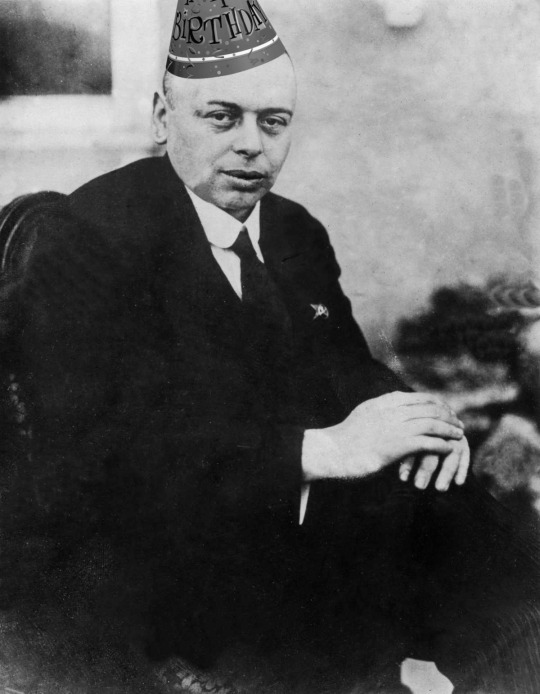
Happy birthday, Bela Kun! (February 20, 1886)
A prominent Hungarian socialist leader, Bela Kun was born in Szilágy County to a secular Jewish family. Kun's academic successes allowed him to pursue higher education, and he became politically conscious as a student. A soldier in World War I, Kun was captured by Russia and sent to a prisoner of war camp. After the Russian Revolution, Kun was released, by which time he had embraced communism. Kun helped to found what would become the Communist Party of Hungary, and fought with the Bolsheviks in the Russian Civil War, gaining experience which would allow him to enact a revolution in his own country. Backed by the Soviets, Kun returned to Hungary, and in March of 1919, Kun took power in Hungary, proclaiming the Hungarian Soviet Republic. However, the republic could not hold and fell apart that same year. Kun fled Hungary and worked for several years as a Comintern functionary before being executed for alleged counterrevolutionary activity; he was posthumously rehabilitated.
82 notes
·
View notes
Text
The VOA ramped up its operations during the Cold War, which also increased its influence. [...] Foy Kohler, the director of VOA during the Cold War, strongly believed that the VOA was serving its purpose, which he identified as aiding in the fight against communism.[34][...] In one [allied] country, regular listeners adopted and practiced American values presented by the broadcast. [...] Kohler used all of this as evidence to claim that the VOA helped to grow and strengthen the free world. It also influenced the UN in their decision to condemn communist actions in Korea, and was a major factor in the decline of communism in the "free world, including key countries such as Italy and France.[34] In Italy, the VOA did not just bring an end to communism, but it caused the country to Americanize.[37] The VOA also had an impact behind the Iron Curtain. Practically all defectors during Kohler's time claimed the VOA helped in their decision to defect. Another indication of impact, according to Kohler, was the Soviet response. Kohler argued that the Soviets responded because the VOA was having an impact. Based on Soviet responses, it can be presumed that the most effective programs were ones that compared the lives of those behind and outside the iron curtain, questions on the practice of slave labor, as well as lies and errors in Stalin's version of Marxism.[34][...]
The Arabic service resumed on January 1, 1950, with a half-hour program. This program grew to 14.5 hours daily during the Suez Crisis of 1956, and was six hours a day by 1958.[33] Between 1952 and 1960, Voice of America used a converted U.S. Coast Guard cutter Courier as a first mobile broadcasting ship.[40]
Control of VOA passed from the State Department to the U.S. Information Agency when the latter was established in 1953[33] to transmit worldwide, including to the countries behind the Iron Curtain and to the People's Republic of China. From 1955 until 2003, VOA broadcast American jazz on the Voice of America Jazz Hour.[...]
During 1953, VOA personnel were subjected to McCarthyist policies, where VOA was accused by Senator Joseph McCarthy, Roy Cohn, and Gerard David Schine of intentionally planning to build weak transmitting stations to sabotage VOA broadcasts. However, the charges were dropped after one month of court hearings in February and March 1953.[43]
Somewhere around 1954, VOA's headquarters were moved from New York to Washington D.C. The arrival of cheap, low-cost transistors enabled the significant growth of shortwave radio listeners. During the Hungarian Revolution of 1956, VOA's broadcasts were deemed controversial, as Hungarian refugees and revolutionaries thought that VOA served as a medium and insinuated the possible arrival of the Western aid.[44][...]
In the early 1980s, VOA began a $1.3 billion rebuilding program to improve broadcast with better technical capabilities. During the implementation of the Martial law in Poland between 1981 and 1983, VOA's Polish broadcasts expanded to seven hours daily. Throughout the 1980s, VOA focused on covering events from the 'American hinterland', such as 150th anniversary of the Oregon Trail.[43] Also in the 1980s, VOA also added a television service, as well as special regional programs to Cuba, Radio Martí and TV Martí. Cuba has consistently attempted to jam such broadcasts and has vociferously protested U.S. broadcasts directed at Cuba. In September 1980, VOA started broadcasting to Afghanistan in Dari and in Pashto in 1982.[52]
During the Cold War, RFE was broadcast to Soviet satellite states, including the Baltic states, and RL targeted the Soviet Union; RFE was founded as an anti-communist propaganda source in 1949 by the National Committee for a Free Europe, while RL was founded two years later. The two organizations merged in 1976.[...]
Radio Free Europe was created and grew in its early years through the efforts of the National Committee for a Free Europe (NCFE), an anti-communist CIA front organization that was formed by Allen Dulles in New York City in 1949.[12][13] RFE/RL received funds covertly from the CIA until 1972.[14][15][...]
The United States funded a long list of projects to counter the "Communist appeal" among intellectuals in Europe and the developing world.[20] RFE was developed out of a belief that the Cold War would eventually be fought by political rather than military means.[21] American policymakers such as George Kennan and John Foster Dulles acknowledged that the Cold War was essentially a war of ideas. The implementation of surrogate radio stations was a key part of the greater psychological war effort.[18][...]
In January 1950, the NCFE obtained a transmitter base at Lampertheim, West Germany, and on July 4 of the same year RFE completed its first broadcast aimed at Czechoslovakia.[23] In late 1950, RFE began to assemble a full-fledged foreign broadcast staff, becoming more than a "mouthpiece for exiles".[24] Teams of journalists were hired for each language service, and an elaborate system of intelligence gathering provided up-to-date broadcast material. Most of this material came from a network of well-connected émigrés and interviews with travelers and defectors. RFE did not use paid agents inside the Iron Curtain and based its bureaus in regions popular with exiles.[25] [...]
Whereas Radio Free Europe broadcast to Soviet satellite countries, Radio Liberty broadcast to the Soviet Union.[29] Radio Liberty was formed by American Committee for the Liberation of the Peoples of Russia (Amcomlib) in 1951.[30][...]
Radio Liberty began broadcasting from Lampertheim on March 1, 1953, gaining a substantial audience when it covered the death of Joseph Stalin four days later. [...]
It also had a base at Oberwiesenfeld Airport on the outskirts of Munich,[33] employing several former Nazi agents who had been involved in the Ostministerium under Gerhard von Mende during World War II.[34] In 1955, Radio Liberty began broadcasting programs to Russia's eastern provinces from shortwave transmitters located on Taiwan.[35] [...]
According to certain European politicians such as Petr Nečas, RFE played a significant role in the collapse of communism [...] RFE publicized anti-Soviet protests and nationalist movements. Its audience increased substantially following the failed Berlin riots of 1953 and the highly publicized defection of Józef Światło.[43] Arch Puddington argues that its Hungarian service's coverage of Poland's Poznań riots in 1956 served as an inspiration for the Hungarian revolution that year.[44]
During the Hungarian Revolution of 1956, RFE broadcasts encouraged rebels to fight and suggested that Western support was imminent.[45] These RFE broadcasts violated Eisenhower's policy, which had determined that the United States would not provide military support for the Revolution.[46] [...]
According to Puddington, Polish Solidarity leader Lech Wałęsa and Russian reformer Grigory Yavlinsky would later recall secretly listening to the broadcasts despite the heavy jamming.[62][...]
During the Cold War RFE was often criticized in the United States as not being sufficiently anti-communist. [...]
RFE/RL received funds from the CIA until 1972.[71] The CIA's relationship with the radio stations began to break down in 1967, when Ramparts magazine published an exposé claiming that the CIA was channeling funds to civilian organizations. Further investigation into the CIA's funding activities revealed its connection to both RFE and RL, sparking significant media outrage.[72][...]
In 1976, the two radio stations merged to form Radio Free Europe/Radio Liberty (RFE/RL) and added the three Baltic language services to their repertoire[...]
Funding for RFE/RL increased during the Reagan administration. President Ronald Reagan, a fervent opponent of Communism, urged the stations to be more critical of the communist regimes. This presented a challenge to RFE/RL's broadcast strategy, which had been very cautious since the controversy over its alleged role in the Hungarian Revolution.[78]
During the Mikhail Gorbachev era in the Soviet Union under Glasnost, RFE/RL benefited significantly from the Soviet Union's new openness. Gorbachev stopped the practice of jamming the broadcasts. In addition, dissident politicians and officials could be freely interviewed by RFE/RL for the first time without fearing persecution or imprisonment.[79] By 1990, Radio Liberty had become the most listened-to Western radio station broadcasting to the Soviet Union.[80]
Its coverage of the 1991 August coup enriched sparse domestic coverage of the event and drew in a wide audience.[81] The broadcasts allowed Gorbachev and Boris Yeltsin to stay in touch with the Russian people during this turbulent period. Boris Yeltsin later expressed his gratitude through a presidential decree allowing Radio Liberty to open a permanent bureau in Moscow.[82]
Following the November 17 demonstrations and brutal crackdown by Czechoslovak riot police, Drahomíra Dražská [cs], a porter at a dormitory in Prague, reported that a student, Martin Šmíd, had been killed during the clashes.[83] The Charter 77 activist Petr Uhl believed this account and passed it along to major news organizations, who broadcast it.[84] After Reuters and the Voice of America (VOA) reported the story, RFE/RL decided to run it too.[85] However, the report later turned out to be false. The story is credited by many sources with inspiring Czechoslovak citizens to join the subsequent (larger) demonstrations which eventually brought down the communist government.[86][87][88]
In addition, Pavel Pecháček, the director of RFE/RL's Czechoslovak service at the time, was mistakenly granted a visa to enter the country by the Czechoslovak authorities prior to the demonstrations. He reported live from the demonstrations in Wenceslas Square, and was virtually the only reporter covering the events fully and openly in Czech for a Czech audience.[89][...]
In 1998, RFE/RL began broadcasting to Iraq.[98] Iraqi president Saddam Hussein ordered Iraqi Intelligence Service, to "violently disrupt the Iraqi broadcasting of Radio Free Europe". IIS planned to attack the headquarters with an RPG-7 from a window across the street. Czech Security Information Service (BIS) foiled the plot.[98]
21 notes
·
View notes